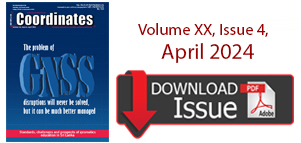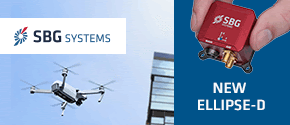Articles in the Galileo Update Category
Industry officials predict current procurement plan will delay
The heads of Europe’s two biggest satellite prime contractors urged the European Commission to accelerate its procurement of the Galileo satellite navigation system or face what might become politically unacceptable delays in getting the service started.
Attending an information conference of European Union space ministers here July 20-22, the chief executives of Astrium Satellites and Thales Alenia Space said the current Galileo procurement process, which began July 1 and is scheduled to continue through
May 2009, is unnecessarily slow “The procurement has been substantially delayed and this schedule introduces more delays,” said Evert Dudok, chief executive of Astrium Satellites. “We need
procurement decisions in 2008 to keep to the service introduction date.” Dudok made his remarks here July 21 during a tour of Europe’s Guiana Space Center spaceport as part of a delegation that included French Research Minister Valerie Pecresse and European Commission Vice President Guenter Verheugen.
Dudok was addressing Pecresse because France assumed the six-month rotating presidency of the European Union July 1. Dudok said France, which has identified space policy as one of the key priorities of its six-month presidency, could use its influence to accelerate the Galileo procurement. Dudok urged Pecresse and Verheugen to use
their influence to get the European Commission permission to remove what he said were needlessly complicated rules on the Galileo procurement.
In an interview, Dudok said it is his understanding the commission has the leeway to bypass some of its procedures to speed up the procurement as long as the major concerns — fair bidding and
inclusion of subcontractors that are not part of the prime contractor’s corporate family — and other concerns are respected.
Thales Alenia Space Chief Executive Reynald Seznec agreed. In an interview, Seznec said Astrium Satellites, Thales Alenia Space and its major subcontractors have assembled a contract proposal that
distributes work throughout Europe and limits the prime contractors’ dominance in a way that complies with European Commission concerns. “We really believe we have come up with a contracting profile that responds to the commission’s concerns and that we could negotiate a final contract much sooner” than mid-2009, Seznec said.
The European Commission, which has assumed overall authority for
Galileo and has delegated the European Space Agency (ESA) as contract oversight authority, issued detailed procurement rules July 1 for the six Galileo work packages. www.wibw.com/
weather/headlines/26238124.html
Europe looks for intellectual GNSS expertise
S With a public funds set aside for Galileo and EGNOS and related projects being put out to bid, Europe is also looking for intellectual GNSS expertise to help it get Galileo in orbit.
The European Commission’s director general for energy and transport is advertising for a “contractor that has extensive experience with the project management of large projects, in particular public sector procurements, and knowledgeable in a range of domains, that will assist the Commission in making strategic decisions, in taking the right programmatic approaches, in analyzing and reviewing the state of the programs at various milestones, and in putting forward recommendations. That’s according to the “invitation to tender” issued by Fotis Karamitsos, head of the European Commission (EC) Directorate-General for Energy and Transport, on June 25.
This call for outside expertise arose from the moves the European Union made in late 2007 to rescue the Galileo program in the wake of the collapse of its public/ private partnership funding mechanism. As part of that decision to make Galileo an entirely public project, it created the European GNSS Programmes Committee to assist the European Commission in administering the Galileo and EGNOS programs. The full invitation to tender document can be downloaded at the European Commission Directorate- General for Energy and Transport website.
Boeing considering submitting bid for EU’s Galileo project
Boeing Co is considering submitting a bid in the forthcoming tender for EU’s Galileo satellite navigation project, Handelsblatt said, citing a Boeing spokeswoman. Handelsblatt said Boeing is interested in participating in the tender for 26 position satellites, which make up one-third of the overall budget for the estimated 3.4 billion euros Galileo project. The Galileo project would be divided into six segments — satellites, launchers, computer programmes, ground stations, control stations and system operation. EU officials have previously said the European Commission and the European Space Agency would launch public tenders by the middle of this year, with a view to first contracts being signed before 2009.http://www.hemscott.com/news/
Galileo and GPS systems to work together
The UK government has published the agreement between it and fellow European governments, and the USA, over the promotion, provision and use of the Galileo and GPS systems.
After many years of wrangling, the Galileo project was finally given the go-ahead by the European Union back in December 2007. Galileo is intended to be an independent alternative to America’s GPS. As recently as the year 2000, the US only provided limited access to GPS to the general public.
Both the United States and the EU signed an agreement way back in June 2004 that GPS and Galileo signals would be interoperable, but it has taken several years for the agreement to be approved by member states. www.techworld.com
Second Galileo test satellite launched successfully
Giove-B, the second test satellite for Galileo, was launched aboard a Russian rocket departing from the Baikonur cosmodrome in Kazakhstan. The European Space Agency confirmed that the two solar panels powering the satellite had deployed without incident and were fully. Giove-B will start In-Orbit Validation of the signal configuration and carry out tests of high precision signal ranging. On board the satellite is an extremely accurate atomic clock based on a MASER (microwave amplification by stimulated emission of radiation) and two rubidium atomic clocks. http://www.heise-online.co.uk
ESA confirms SSTL’s GIOVE-A full mission success
GIOVE-A, the first satellite in the Galileo satellite navigation system celebrates 27 months in orbit this month, marking the completion of its nominal mission lifetime. The European Space Agency (ESA) has confirmed that the pioneering Medium-Earth Orbit satellite is a “full mission success” and has contracted SSTL to continue operations for an additional year as the satellite continues to perform and provide valuable Galileo services. Under a 28M euros contract, the 660kg satellite was developed by SSTL for the ESA.
The primary mission was to secure the Galileo frequency filings at the International Telecommunications Union. The satellite also played a crucial role as a test-bed for the Galileo payload units, providing a representative signal-in-space for ground-based experimentation with Galileo signals and characterizing the radiation environment for the Medium Earth Orbit which will be used by all future Galileo satellites. Following successful launch and commissioning, the GIOVE-A team undertook an intensive six-week payload in-orbit test campaign using the 25m dish at the Science Technology and Facilities Council Chilbolton station. Through these activities ESA was able to claim the frequency filings three months before the license expired.
Since commissioning the satellite has achieved a remarkably high operational availability with signals being broadcast for 99.8% of the time over the last year. The primary atomic clock, fundamental to all future Galileo satellites in providing highly accurate positioning and time reference signals, has been operating continuously since June 2007. Thirteen sensor stations around the world are used by ESA to track GIOVE-A and GPS navigation signals and these have demonstrated that Galileo will be a highly accurate navigation system. www.gpsdaily.com
Study on Galileo services consolidation
The European GNSS Supervisory Authority has issued a call for tenders for a study on Galileo service consolidation. The general aim of the project is to conduct a critical review of the current Galileo integrity baseline concept, based on the evolution of integrity requirements for Galileo, and receive proposals for new global Galileo integrity concepts. For details visit: http://ted.europa. eu/udl?uri=TED:NOTICE:039425- 2008:TEXT:EN:HTML
Norwegian Prime Minister opens new Antarctic satellite station
“The Norwegian satellite station TrollSat is a milestone in satellite surveillance of the environment”, Prime Minister Jens Stoltenberg said. It offers better and quicker access to vital climate, environment and weather data. The data will be used in research and in other environment surveillance. He also laid the foundation stone for the Galileo station next to TrollSat. The station will be ready in 2009. The Galileo station in the Antarctic will be part of the European navigation system Galileo, which will be operational in 2013 and be based on space satellites. www.norwaypost.no
Galileo gets the go-ahead
Galileo finally got the go-ahead at the end of November when European nations involved in the project agreed to build the EUR 3.4 billion satellite navigation system. Thirty satellites will be placed in a mid-earth orbit and supported by ground stations in Italy and Germany. A third ground centre dedicated to civil protection, in particular in the area of maritime, air and rail security, will be based in Spain. This control centre is expected to take on further responsibilities as the Galileo system is developed. www.djnewswires.com/eu
INDUSTRY | LBS | GPS | GIS | REMOTE SENSING | GALILEO UPDATE
Partial funding through EU farming subsidies
Following months of disagreements, the EU has reached a funding compromise and resolved the crisis around its Galileo satellite navigation system. Two thirds of the missing 2.4 billion euros will be provided from EU farming pots alone. …







 (5.00 out of 5)
(5.00 out of 5)